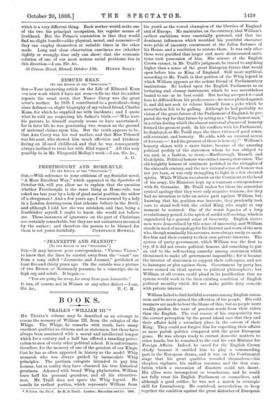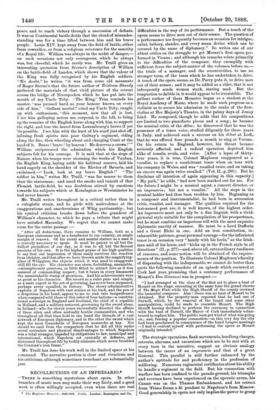BOOKS.
TRAILL'S " WILT,T A M "* MR. TRAILL'S volume may be described as an attempt to rescue the memory of William 11E. from the eulogies of the Whigs. The Whigs, he remarks with truth, have many excellent qualities as citizens and as statesmen, but these have always been associated with a moral and intellectual temper which for a century and a half has offered a standing provo- cation to men of every other political school. It is unfortunate, therefore, for the memory of one of the greatest of our Kings, that he has so often appeared in history as the model Whig monarch who was always guided by immaculate Whig principles. The partisan eulogists intended to pay him honour, but in reality they have obscured his true historical greatness. Adorned with. broad Whig phylacteries, William loses half his personal grandeur, and all his attractive- ness. Mr. Train does not spare the Whig legend. He assails its earliest portion, which represents William from * William tha Tied. By H. D. Trail]. London: Macmillan and Co. 18E8.
his youth as the vowed champion of the liberties of England and of Europe. He maintains, on the contrary, that William's earliest ambitions were essentially personal, and that the dominant influences which moulded his youthful character were pride of ancestry, resentment at the fallen fortunes of his House, and a resolution to restore them. It was only after these were gratified that larger and more disinterested ambi- tions took possession of him. His seizure of the English Crown cannot, in Mr. Trail's judgment, be traced to anything higher than a sense of the great European future that would open before him as King of England. Still more mythical, according to Mr. Trail!, is that portion of the Whig legend in which William appears as the ardent friend of Parliamentary institutions. He looked upon the English Parliament as an irritating and clumsy instrument, which he was nevertheless bound to use as he best could. But haying accepted it—and here he differed from his predecessors—he never plotted against it, and did not seek to release himself from a yoke which he nevertheless felt to be galling. Although he had probably no vision of the great future of the Parliament of England, he pre- pared the way for that future by acting as a "King honest man;' in a crisis during which the almost universal absence of honesty formed the greatest peril. In his conflicts with his Parliament, he displayed, as Mr. Trail says, the three virtues of good sense, self-restraint, and honesty. He adds, with an unusual access of fervour,—" And the greatest of these is honesty I." William's honesty shines with a rarer lustre, because of the amazing political perfidy of the statesmen whom he was obliged to use and, in a fashion, to trust, —Marlborough, Russell, and Godolphin. Political honour was extinct among statesmen. The old knightly honour of sentiment perished in the struggles of the sixteenth century, and the new rational sense of honour was not yet born, or was only struggling to light in a few elevated spirits. While William was absent on the Continent at the head of his army, his Ministers kept up a constant correspondence with St. Germains, Mr. Trail' makes for them the somewhat cynical apology that they were only negative traitors ; for they had no intention to take an active part against William, but, knowing that his position was insecure, they prudently took care to stand well with the exiled King, who might at any moment be restored. One of the worst legacies of a long revolutionary period, is the spirit of sordid self-seeking, which is engendered by a general sense of insecurity. English states- men were demoralised by this sense of insecurity, and William stands in need of no apology for his distrust and scorn of the men who, though nominally his servants, were always ready to sacri- fice him and their country to their own private interests. The system of party government, which William was the first to try, if it did not create political honour, did something to put an end to the self-seeking anarchy among statesmen which threatened to make all govern.ment impossible ; for it became the interest of statesmen to support their colleagues, and not to harangue or plot against them. Government by party has never seemed an ideal system to political philosophers ; but William, at all events, could plead in its justification that no system would work in the then existing condition of English political morality which did not make public duty coincide with private interest.
William failed to find faithful servants among English states- men, and he never gained the affection of his people. His cold manners are made to bear the blame of this; but no people more readily pardon the want of gracious words from their rulers than the English. The real reason of his unpopularity was the correct perception by the proud island race that they and their affairs held a secondary place in the esteem of their King. They could not forgive him for regarding their affairs as mere parish politics compared with the great European game. He was always ready to entrust domestic matters to other hands, but he remained to the end his own Minister for Foreign Affairs. Indeed, he cared for the English Crown chiefly because it enabled him to play a commanding part in the European drama, and it was on the Continental stage that his great qualities revealed themselves,—his sleepless vigilance, his endless resource, and the iron reso- lution which a succession of disasters could not daunt. His allies were incompetent or treacherous, and he could not fully trust his English Parliament or counsellors, and although a good soldier, he was not a match in strategic skill for Luxembourg. He contrived, nevertheless, to keep together the coalition against the great disturber of European peace, and to reach victory through a succession of defeats. It was on Continental battle-fields that the cloud of misunder- standing was for a time lifted between him and his brave people. Louis XIV. kept away from the field of battle, either from cowardice, or from a religious reverence for the sanctity of a Royal life. William was always in the midst of danger,— on such occasions not only courageous, which he always was, but cheerful, which he rarely was. Mr. Traill gives an interesting quotation from Sterne's description of William on the battle-field of Landen, which shows that the valour of the King was fully recognised by his English soldiers. "No doubt," he writes, "it was from some old messmate of Roger Sterne's that the future author of Tristram Shandy gathered the materials of that vivid picture of the retreat across the bridge of Neerspeeken which he has put into the mouth of my Uncle Toby. The King,' Trim reminds his master. 'was pressed hard, as your honour knows, on every side of him." Gallant mortal !' cried my Uncle Toby, caught up with enthusiasm, this moment, now that all is lost, I see him galloping across me, corporal, to the left, to bring up the remains of the English horse along with him to support the right, and tear the laurel from Luxembourg's brows if yet 'tis possible. I see him with the knot of his scarf just shot off, infusing fresh spirits into poor Galway's regiment, riding along the line, then wheeling about and charging Conti at the head of it. Brave ! brave ! by heaven ! He deserves a crown !" William reciprocated the admiration which his English subjects felt for his courage. It is said that at the siege of Namur, when his troops were storming the works of Vauban, the English King, laying aside his habitual reserve, laid his hand eagerly on the shoulder of the Elector of Bavaria, and exclaimed,—" Look, look at my brave English !" "The soldier in him," writes Mr. Trail!, "was far nearer to them than the statesman ; and amid the smoke and tumult of that Flemish battle-field, he was doubtless stirred by emotions towards his subjects which at Kensington or Westminster he had never known."
Mr. Ti-sill writes throughout in a critical rather than in a eulogistic strain, and he girds with malevolence at the exaggerations and anachronisms of Whig partisanship ; but his cynical criticism breaks down before the grandeur of William's character, to which he pays a tribute that might have satisfied Macaulay. We regret that we cannot make room for the entire passage :—
" After all deductions, there remains to William, both as a European statesman and as a benefactor to our country, an ample margin of renown. Of his moral and mental stature as a man it is scarcely necessary to speak. It must be patent to all but the dullest prejudices of our day, as it was to all but the fiercest passions of his own. It is the highest praise of his high qualities to say that our impression of them easily survives the reaction from idolatry, and that alter we have thrown aside the magnifying- glass of Whiggism, the objects which it was used to exaggerate still fill the eye. His character was stern, forbidding, unamiable, contemptuously generous, as little fitted to attract love as it was assured of commanding respect ; but it bears in every lineament the unmistakable stamp of greatness. And his achievements were as great as his character. His record as a ruler pure and simple, as a mere expert in the art of governing, has never been surpassed, perhaps never equalled, in history. The showy administrative exploits of Napoleon with vast armies at his back, and the pen of a despotism in his hand, appear to me to sink into insignificance when compared with those of this ruler of four nations—a constitu- tional sovereign in England and Scotland, the chief of a republic in Holland, and a military autocrat, governing by the sword alone, in Ireland—who for eleven years successfully directed the affairs of these alien and often mutually hostile communities, and who throughout all that time held in one hand the threads of a vast network of European diplomacy, and in the other the sword which kept the most formidable of European monarchs at bay. Nor should we omit from the comparison that he did all this under moral restraints and physical disadvantages to which Napoleon was a total stranger, impeded by obligations to law, municipal and international, which Napoleon set cynically at defiance, and distressed throughout life by bodily ailments which never troubled the Corsican's iron frame."
Mr. Trail has done his work well in the limited space at his command. The narrative portion is clear and vivacious, and his criticisms, although sometimes trenchant, are substantially just.



































 Previous page
Previous page